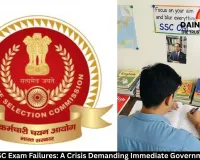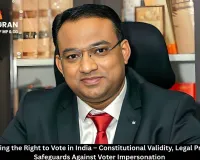Supreme Court Slaps Down SC/ST Act Misuse: A Wake-Up Call for Overzealous Policing
Digital Desk

In a landmark ruling that could redefine the boundaries of the Scheduled Castes and Scheduled Tribes (Prevention of Atrocities) Act, 1989—commonly known as the SC/ST Act—the Supreme Court of India has granted anticipatory bail to a 55-year-old Kerala man accused of a seemingly routine altercation.
The case, Siddharthan vs. State of Kerala and Others, heard by Justices A.S. Oka and Ujjal Bhuyan (as per recent bench updates), exposes the perils of "over-enthusiasm" in invoking this stringent law, where a simple English expletive like "bastard" was twisted into a purported caste-based slur.
This decision, delivered just days ago, isn't merely a procedural win—it's a clarion call against the casual weaponization of protective legislation, urging a return to intent-driven justice over knee-jerk reactions.
The facts are disarmingly straightforward, mirroring everyday frictions that plague our roads. The complainant, allegedly under the influence of alcohol, claimed the accused blocked a public road, threatened him, assaulted him with a chopper, and hurled the word "bastard" during the scuffle.
No prior enmity, no explicit reference to the complainant's Scheduled Caste identity—yet Kerala Police swiftly amended the FIR to slap on the SC/ST Act, deeming the slur "casteist."
Section 18 of the Act, which bars anticipatory bail in atrocity cases, sealed the Kerala High Court's rejection of the man's plea, hurtling him toward inevitable arrest. But the apex court intervened, dissecting the complaint with surgical precision.
"No caste-based slur was uttered," the bench declared, after scrutinizing the FIR and medical reports. The injuries? Minor abrasions, far from the grievous harm warranting such draconian measures. "Bastard" may sting as an abusive word, but it's a generic insult devoid of caste malice, the Court reasoned.
This isn't pedantry; it's a safeguard against the Act's noble intent being diluted into a tool for vendettas. The judges lambasted the police for their "over-enthusiasm," noting how the absence of any allegation tying the slur to the victim's SC status didn't deter them from invoking the law. Even the High Court, they observed, was misled into upholding this overreach.
From an opinion standpoint, this verdict is a breath of fresh air in an era where the SC/ST Act—enacted to shield marginalized communities from caste-based discrimination and humiliation—has morphed into a double-edged sword.
Post-2018 amendments, following the Court's own controversial dilution attempt in Dr. Subhash Kashinath Mahajan vs. State of Maharashtra, the law's rigor aimed to deter atrocities.
Yet, as this case illustrates, unbridled application risks eroding public trust. Imagine: a heated exchange spirals into an atrocity charge sans evidence of caste animus.
It doesn't just clog courts; it stigmatizes genuine victims, making future claims harder to substantiate. The SC's warning rings true—misuse could "undermine the democratic structure" by fostering cynicism toward affirmative protections.
Broader implications? This ruling reinforces that the Act activates only when caste-based humiliation is palpably inflicted, not in every altercation involving SC/ST individuals.
It echoes recent jurisprudence, like the September 2025 Kiran vs. Rajkumar decision upholding Section 18's bar but only for bona fide cases. For law enforcement, it's a directive: Probe deeper before escalating. For society, a reminder that justice thrives on nuance, not blanket invocations.
Critics might decry this as softening safeguards, but that's shortsighted. True empowerment lies in credible enforcement, not overreach that invites backlash.
As India grapples with persistent caste fault lines, the Supreme Court's stance in Siddharthan—granting bail subject to investigating officer's terms while sternly cautioning against misuse—strikes a pragmatic balance.
It's a latest update worth heeding: Protect the vulnerable, but don't punish the innocent. In doing so, we fortify, rather than fracture, the edifice of equality.






.jpg)




